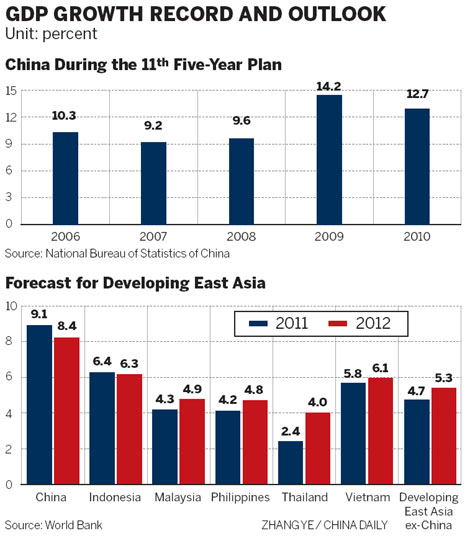Lower GDP growth rate forecast
Updated: 2011-11-23 11:00
By Hu Yuanyuan and Chen Jia (China Daily)
|
|||||||||
World Bank revises outlook; nation unlikely to loosen economic reins
BEIJING - The World Bank has lowered its GDP growth forecast for China to 9.1 percent for this year and 8.4 percent for 2012, amid growing concerns about impact of the European debt crisis on the world's second-largest economy.
|
 |
|
A cargo vessel being loaded at Lianyungang Port in Jiangsu province. On Tuesday, the World Bank lowered China's GDP growth forecast to 9.1 percent for 2011 and 8.4 percent for 2012.[Photo / China Daily] |
But analysts said the downturn may not necessarily mean an instant easing in the country's monetary policies.
The bank revised down its previous projections of 9.3 percent for this year and 8.7 percent for next year because of weakening external demand, the government's measures to cool the property sector and the tightening credit policies, according to Ardo Hansson, lead economist for China at the World Bank.
"Instead of taming inflation, preventing a rapid decline in the economy will turn out to be the central government's primary task in the coming months," said Li Yang, vice-president of the Chinese Academy of Social Sciences and a former adviser to the central bank.
China's consumer price index (CPI), a key gauge of inflation, rose 5.5 percent year-on-year last month, a further decline from 6.1 percent in September, after surging to a 37-month high of 6.5 percent in July.
The World Bank estimated that China's inflationary pressure will ease further next year, predicting that CPI will grow 5.3 percent this year and 4.1 percent next.
Meanwhile, "the downward trend in China's economic growth rate has begun, and the authorities should take measures to prepare for an even worse scenario", Li said.
However, those measures would not include China loosening its monetary policy now, economists said.
"I would be more cautious about the monetary loosening, because the CPI just softened for two months and our forecast of 9.1 percent growth is still above the government's GDP target this year," Hansson said. "I would suggest the government stop the tightening measures for a while to see what happens next."
Xia Bin, one of the 15 members of the central bank's monetary policy committee, said China will not loosen monetary policy but should take measures to increase domestic demand as the country faces a poor environment for its exports next year because of weak demand from the US and Europe.
Analysts are now worrying about a possible trade deficit for China next year if weakening external demand because of the European debt crisis continues or even worsens.
"We can't rule out the possibility of a trade deficit next year," Xia was quoted by Reuters as saying on Tuesday. "To increase domestic demand, fiscal policy must be very proactive, reform of the tax system should be speeded up and wages raised to stimulate consumption."
Li suggested that in the last two months of this year, the nation could encourage faster growth of new loans from commercial banks to shore up fixed-asset investments and avoid a hard landing.
"I don't expect any cut in the benchmark interest rate, nor an easing of the required-reserve ratio," Li said.
According to Liu Shijin, deputy director of the Development Research Center of the State Council, the Chinese economy has entered a period of moderate "GDP growth which is likely to drop into a range between 6 percent and 7 percent in the next 10 years".
China's industrialization process will eventually slow in the long term, Liu said.
Chen Keyu contributed to this story.












